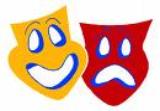Tips for Parents: Teaching the Use of Humor to Cope with Stress Stress and beauty are both in the eye of the beholder. Life itself causes stress because we continually have to respond to the everyday demands of life and consciously decide what to do and how to feel in every situation. Humor – whether in the home, school or office – is becoming recognized as a vital part of increasing creative solutions to problems and reducing the negative effects of stress. Every child is the product of his/her interaction with the various influences he/she encounters during daily living. Children are notorious for being able to see and aptly point out the inequalities in life and society. They are very concerned with issues of justice and fair play. Several characteristics of children relate to humor. Various social, moral, and ethical issues can be addressed and explored through humor. Humor can open a safe window through which the child can observe, understand and enjoy the human condition with all its imperfections. Humor allows for, even encourages, an enhanced awareness of the world, its passions and its various juxtapositions. Humor is a natural way to cope with stress. Children need positive methods of dealing with deep, and often depressing, issues of life. Humor is natural and involved in almost every aspect of life. It is a universal part of the human experience. Positive humor can be the “safety valve” which allows the experience of life to continue, yet keeps the stress of existence from growing to unbearable levels. Stress can help children successfully deal with the events of life, and in so doing it can become an important source of self-confirmation. Successfully dealing with various stressors gives children an indication of self-control and personal power. Too much or too little stress, however, can be harmful to the well-being of the child and detrimental to personal development. Learning is fun – or rather – it is supposed to be fun. Remember the laughter of the baby that learns something new or one of those “ah-ha” experiences you have had? It is contagious and feels great. In fact, laughter from positive humor is healthy for the body and the spirit. In order to practice, teach, and encourage positive humor in the home you need to understand it. The more you understand positive humor the more likely it is that you will create a happy, secure environment where it will be both safe and fun to learn. Learning involves the complete self, including emotions. Research is proving that we must pay attention to the whole child, not just the logical/reasoning aspect. Destructive Humor vs. Constructive Humor— You know it is Destructive when it… Lowers self-esteem, belittles someone, excludes someone, creates tension, stimulates laughter AT someone, perpetuates a stereotype, creates barriers, creates defensiveness, closes off creative thoughts, and focuses on negatives. You know it is Constructive when it… Raises self-esteem, is supportive, includes people, reduces tension, stimulates laughter WITH someone, confronts stereotyping ideas, breaks down barriers, relaxes people, stimulates new ideas, and creates a positive atmosphere and energy. Purposes of Humor:
“Rights” of Humor:
Negative humor should not be confused with “dark” humor. Dark humor is employed to help relieve the stress of bad situations. It is interesting that most people who work in areas of high stress, such as surgeons, psychologists, firemen, police, soldiers, etc., employ "dark" humor to deal with the fears and stress they encounter in daily life on the job. Humor is a way of relieving that stress. Laughter actually releases endorphins and is natures "anti-depression medicine". Being able to express “dark” humor in cartoons can also contribute to the feeling of some control over life for the child. This page is intended to help you, as a parent, help your child gain a new perspective on life. It is designed to teach ways of seeing humor in the world. Your job is to help your child not only tap into their passions, but to teach them methods to define and express their passions in understandable and socially acceptable ways. Humor is the mirror in which we see ourselves and our fellow human beings. Don't limit your thinking!!! To see humor in the world you usually have to look for it ...at least be open to seeing it when it is right in front of you. Teach yourself (your child) to see things ...not just look at them. See with an eye to details and juxtapositions ...look for those "odd bedfellows" whether they are in politics or physics or economics ...open yourself up to the world around you. I think that some quotes on the subject might be a good way help you improve your sense of humor: "You can turn painful situations around through laughter. If you can find humor in anything, you can survive it." Bill Cosby "Anything worth taking seriously is worth making fun of." Tom Lehrer "Laughter is the closest distance between two people." Victor Borge "Laughter and tears are both responses to frustration and exhaustion. I myself prefer to laugh since there is less cleaning up to do afterwards." Kurt Vonnegut "He deserves Paradise who makes his companions laugh." The Koran "Comedy = tragedy + time." Carol Burnett "Humor allows man to create perspective, to put distance between himself and whatever may confront him. Humor allows man to detach himself from himself and thereby retain the fullest possible control over himself." Viktor Frankl "To be playful and serious at the same time is possible and defines the ideal mental condition." John Dewey "Stress and humor must exist in order to create the dynamic force that propels the human animal. It is in learning to accept and utilize both, that people are able to advance beyond the fear of living and find the joy of life." Dan Holt "Life does not cease to be funny when someone dies, anymore than it ceases to be serious when someone laughs." George Bernard Shaw When All Else Fails, Parent with Humor— Parenting works best with jokes, playfulness, and cooperation -- not threats and demands. When it comes to parenting, it’s funny how humor can motivate children when more negative tactics do not. Being playful keeps it from turning into a contest of wills. When moms or dads issue angry commands, kids of all ages tend to dig in their heels and resist – and no one benefits. Humor is a key tool to successful discipline. Humor takes us to a whole different level of consciousness. Humor helps break the negative mood not just for children, but for grown-ups, too. It helps parents get themselves out of a reactive state. Finding the lighter side will serve adults and kids well in the long run. I ask parents in workshops how they would feel if they had a boss or a spouse who told them ‘Do it!’ and told them exactly how to do it. How long would you stay in that job? How long would you stay in that marriage? Think about the long-term results of parenting. We don’t want our kids to just be obedient. We want them to do things because they feel capable, because they want to cooperate, because they understand. Respect your child. Kids have the ability to see things differently, feel differently … and parents need to do that, too. Parent positively. Think positive, not just controlling vs. permissive. All these positive tools are about being kind, firm, and respectful – all at the same time. Avoid teasing your child. Any kind of humor that is hurtful or disrespectful or a poorly disguised put- down is no good. You know the difference, and they know the difference. One-liners you can deliver to your knuckle-head teenager--
CAUTION: Deliver these one-liners with a smile -- and only use them (a) when you are in a "playful spirit" and (b) when your knuckle-head teenager knows you are teasing. |






